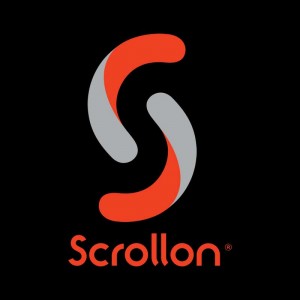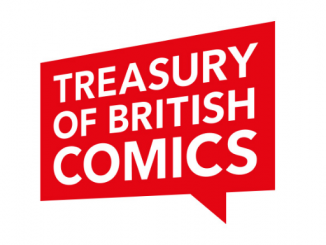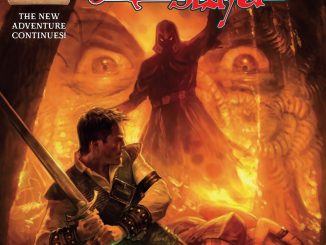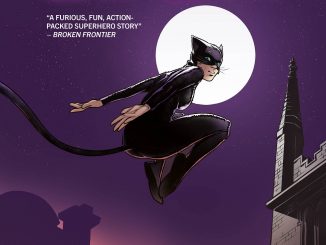It’s been a while since we’ve had one of these, here are 10 Questions With Doug Lefler of Scrollon – the digital comics app:
Scrollon® was created by filmmaker Doug Lefler, who took inspiration from an ancient Chinese scroll painting. It grew from a simple concept, that the experience of reading a pictorial story (such as a comic book or children’s book) on a mobile device is an inherently different experience than reading a printed book. Lefler developed the technology and visual language that permits telling stories uninterrupted by page breaks or borders.
1. Who are you and what are you working on right now? (2 questions in 1, I know!)
I’m Doug Lefler, a filmmaker by trade; currently working on a new form of digital comics called Scrollon.
2. What drew you to digital comics?
I’ve made my living as a storyboard artist, director and screenwriter, in that order. After directing my last film I was tired of writing screenplays and decided to create a graphic novel called Seven Extraordinary Things. When it was halfway finished I sent it to four publishers. Two of them wanted it and sent me sample contracts which stated three things: 1) “Don’t expect to make a dime off of this”, 2) “Be prepared to promote it yourself”, and 3) “We want 20% of the ancillary market”.
I was prepared not to make money. And I was willing to do the work of promoting it, but I couldn’t justify giving up 20% of the ancillary. So I explored putting it online…
3. Webcomics or digital comics?
I created a website for Seven Extraordinary Things and studied what other people were doing with webcomics. Most of what I saw was in portrait layout that didn’t fit comfortably on a computer screen and looked like the unwanted step-child of print. I decided to repurpose my story and broke each page into individual panels. I posted one panel a day, every single day for a little over a year. (It’s still online, for anyone who wants to read it at www.sevenextraordinarythings.com.)
This led me to think about publishing comics digitally, but I wanted to create something that would fit gracefully onto the screens of computers and smart phones and tablets. That’s when I remembered an idea I had 35 years ago…
4. What do you think works with digital comics?
Repurposing comics designed for print can work, but eventually it must be replaced by content created specifically for the medium through which it is being delivered. My favourite comparison is the difference between film and theatre. You can watch a play and be enthralled by the live performances in front of you. But if you were to film the play and project it on a movie screen it would not be so satisfying. Although film shares many theatrical elements it is its own art form and requires its own visual language.
Digital comics need to have their own visual grammar. While we’re creating it there is no reason we should be bound to the pre-twelfth century technology of book binding.
When I was a young art student I was shown a Chinese scroll painting that was one very long landscape. I became intrigued by the possibility of telling a story with a continuous image. But at that time I couldn’t figure out how you would mass produce such a thing. I could draw a story on a long roll of paper, but how would I print it? I tabled the idea and let it collect dust for three and a half decades. Eventually we got the internet, and apps, and tablets and my old idea had merit once again. I hired programmers, filed a patent and set out to draw a comic book without pages or borders.
Scrollon® was born.
5. Can digital comics replace print comics?
No. And they shouldn’t. Books will always be with us, even if they become more of a specialty item. The experience of reading a book cannot be replaced. Digital books, and especially digital comic books should strive to do something different.
6. How can print comics work with digital comics?
I suggest testing content digitally, where the distribution costs are miniscule and the printing costs non-existent. This allows for more experimentation, and hopefully more output. When popularity deems it worthwhile, create a print version and sell it to your previously established following.
7. What don’t you like about digital comics?
Every art form has its strengths and weaknesses. Digital comics don’t have the same tactile experience as holding a book in your hands.
Scrollon has its limitations. Page breaks can be used to effectively to parse out story beats. Images that are contained within panels allow you to focus only on what the creator deems important. In place of that Scrollon offers a different kind of timing, one that is regulated by distance. And I believe the experience of travelling through an uninterrupted story is more immersive.
8. What digital comics/webcomics do you read?
I am personally doing my part to keep Comixology in business. They have the most content. It will take some time for digital first comics to catch up with the seventy-plus year libraries of companies like DC and Marvel.
9. Where do you see digital comics going from here?
Onto tablets large and small. All our computing will be done on touch screen monitors in the near future.
10. Who do you think we should look out for in digital comics?
I’m personally keeping an eye on everything Mark Waid does outside of his day job.





